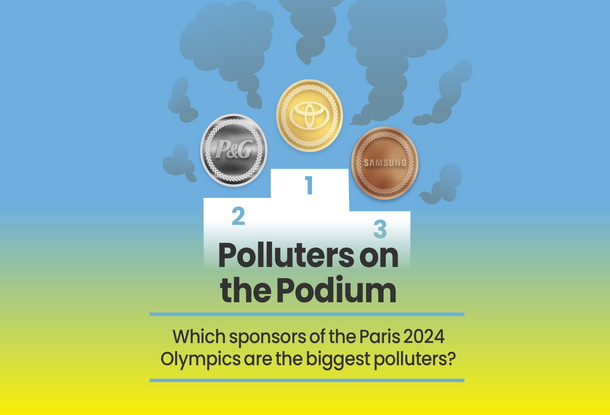In the week of the Olympics opening ceremony, new research from the New Weather Institute reveals the most climate-polluting worldwide sponsors of the 2024 Paris Games.
The Olympic Partner (TOP) programme is the highest level of Olympic sponsorship, granting exclusive, global marketing rights to the Olympic and Paralympic Games and Olympic teams around the world to a select group of 15 Worldwide Olympic Partners.
In this report, we compare the self-reported emissions of these top-tier sponsors, to find out which are the highest emitters of greenhouse gases (GHGs).
The top three polluters, awarded ironic medals as “Polluters on the Podium”, are:
🥇 Gold: Toyota
🥈 Silver: Procter & Gamble
🥉 Bronze: Samsung

The Gold -medal winning polluter, Toyota, not only reports much higher CO2 emissions than the Olympic host nation France; it also emits more than all but 11 of the countries taking part in the Olympics this year.
The Olympics is meant to push human ability beyond its known limits, but the biggest, highly polluting sponsor of the games, Toyota, is driving humanity over a climate cliff.
It is bizarre that a company which adds more fossil-fuel powered vehicles to the roads per year than any other (over 11 million), still has rapidly rising emissions, and which is lobbying governments aggressively to block and delay the transition to Electric Vehicles, should have been granted the privilege of being an Olympic partner.
“The Olympics is meant to push human ability beyond its known limits, but the biggest, highly polluting sponsor of the games, Toyota, is driving humanity over a climate cliff. Organisers talk about the need for clean sport, and for these to be the greenest Games ever, yet they put a major polluter on the top spot of the Olympic sponsor’s podium. Toyota has opposed moves to clean the air of transport emissions, and doubled down on making dirtier cars. They should be disqualified by the track judge for making a false green start, not given a profile-medal,” says Andrew Simms, co-director of the New Weather Institute.
Responsibility for leading the systemic change needed to prevent more unnatural disasters must sit primarily with the companies that create the goods and services whose carbon pollution is damaging our climate
Jennifer Casson, Paris Olympic rower
Added Jennifer Casson, Canadian rowing Olympian who is competing in Paris: “Responsibility for leading the systemic change needed to prevent more unnatural disasters must sit primarily with the companies that create the goods and services whose carbon pollution is damaging our climate. Companies like Toyota, the first ever “mobility partner” for the Olympic Games, have the power and financial resources to be climate leaders, to alter our trajectory from climate crisis to climate comeback.”
Meaningful action on climate change… means not just talking about the problems caused or exacerbated by climate change, but… calling out organisations who sponsor events but do not take climate change seriously
Rhydian Cowley, Australian racewalker
Rhydian Cowley, an Australian racewalker also added his voice to the growing number of Olympians concerned about climate change and sportswashing at the Paris Olympics: “Athletes are the face of sports, especially at the Olympics. If they are silent on climate change, then so is sport – and the world will lose its chance to take meaningful action on climate change in time to prevent catastrophic loss and damage. For athletes, this means not just talking about the problems caused or exacerbated by climate change, but also talking about existing solutions, and calling out organisations who sponsor events but do not take climate change seriously, and lobby to delay the actions needed to drastically cut greenhouse gas emissions. For me, an example of this would be Toyota. In my country, Australia, Toyota has gone from leading through the rollout of hybrid vehicles, to lobbying against fuel efficiency standards, and actively seeking to hamper and slow down Australia’s transition towards electric vehicles.”
The report also assesses the ways that Olympic sponsorship itself is used by polluting companies to maintain positive social licence, similar to how tobacco companies used to be allowed to sponsor sporting events.
Carbon-intensive companies must go the same way as tobacco companies, and be removed from the face of sport.
We urge the International Olympic Committee (IOC) to drop giant polluting sponsors like these, and partner with companies genuinely driving forwards the energy transition.














